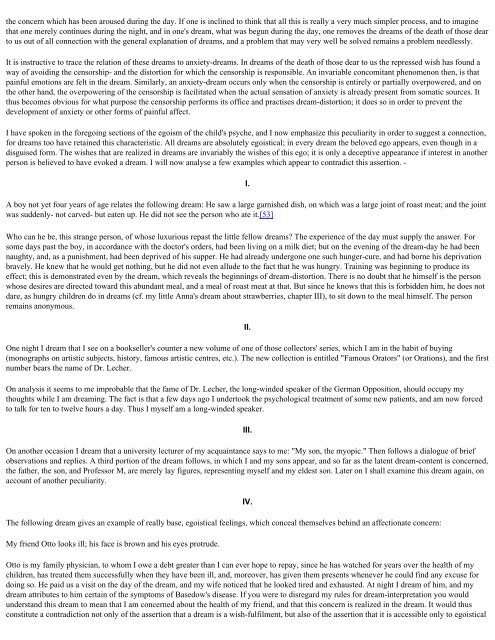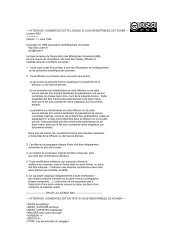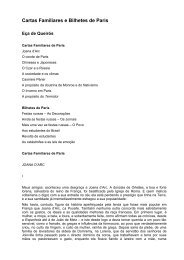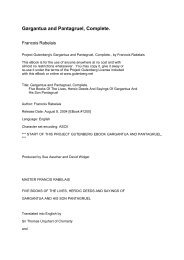The Interpretation of Dreams Sigmund Freud (1900)
The Interpretation of Dreams Sigmund Freud (1900)
The Interpretation of Dreams Sigmund Freud (1900)
Create successful ePaper yourself
Turn your PDF publications into a flip-book with our unique Google optimized e-Paper software.
the concern which has been aroused during the day. If one is inclined to think that all this is really a very much simpler process, and to imagine<br />
that one merely continues during the night, and in one's dream, what was begun during the day, one removes the dreams <strong>of</strong> the death <strong>of</strong> those dear<br />
to us out <strong>of</strong> all connection with the general explanation <strong>of</strong> dreams, and a problem that may very well be solved remains a problem needlessly.<br />
It is instructive to trace the relation <strong>of</strong> these dreams to anxiety-dreams. In dreams <strong>of</strong> the death <strong>of</strong> those dear to us the repressed wish has found a<br />
way <strong>of</strong> avoiding the censorship- and the distortion for which the censorship is responsible. An invariable concomitant phenomenon then, is that<br />
painful emotions are felt in the dream. Similarly, an anxiety-dream occurs only when the censorship is entirely or partially overpowered, and on<br />
the other hand, the overpowering <strong>of</strong> the censorship is facilitated when the actual sensation <strong>of</strong> anxiety is already present from somatic sources. It<br />
thus becomes obvious for what purpose the censorship performs its <strong>of</strong>fice and practises dream-distortion; it does so in order to prevent the<br />
development <strong>of</strong> anxiety or other forms <strong>of</strong> painful affect.<br />
I have spoken in the foregoing sections <strong>of</strong> the egoism <strong>of</strong> the child's psyche, and I now emphasize this peculiarity in order to suggest a connection,<br />
for dreams too have retained this characteristic. All dreams are absolutely egoistical; in every dream the beloved ego appears, even though in a<br />
disguised form. <strong>The</strong> wishes that are realized in dreams are invariably the wishes <strong>of</strong> this ego; it is only a deceptive appearance if interest in another<br />
person is believed to have evoked a dream. I will now analyse a few examples which appear to contradict this assertion. -<br />
A boy not yet four years <strong>of</strong> age relates the following dream: He saw a large garnished dish, on which was a large joint <strong>of</strong> roast meat; and the joint<br />
was suddenly- not carved- but eaten up. He did not see the person who ate it.[53]<br />
I.<br />
Who can he be, this strange person, <strong>of</strong> whose luxurious repast the little fellow dreams? <strong>The</strong> experience <strong>of</strong> the day must supply the answer. For<br />
some days past the boy, in accordance with the doctor's orders, had been living on a milk diet; but on the evening <strong>of</strong> the dream-day he had been<br />
naughty, and, as a punishment, had been deprived <strong>of</strong> his supper. He had already undergone one such hunger-cure, and had borne his deprivation<br />
bravely. He knew that he would get nothing, but he did not even allude to the fact that he was hungry. Training was beginning to produce its<br />
effect; this is demonstrated even by the dream, which reveals the beginnings <strong>of</strong> dream-distortion. <strong>The</strong>re is no doubt that he himself is the person<br />
whose desires are directed toward this abundant meal, and a meal <strong>of</strong> roast meat at that. But since he knows that this is forbidden him, he does not<br />
dare, as hungry children do in dreams (cf. my little Anna's dream about strawberries, chapter III), to sit down to the meal himself. <strong>The</strong> person<br />
remains anonymous.<br />
II.<br />
One night I dream that I see on a bookseller's counter a new volume <strong>of</strong> one <strong>of</strong> those collectors' series, which I am in the habit <strong>of</strong> buying<br />
(monographs on artistic subjects, history, famous artistic centres, etc.). <strong>The</strong> new collection is entitled "Famous Orators" (or Orations), and the first<br />
number bears the name <strong>of</strong> Dr. Lecher.<br />
On analysis it seems to me improbable that the fame <strong>of</strong> Dr. Lecher, the long-winded speaker <strong>of</strong> the German Opposition, should occupy my<br />
thoughts while I am dreaming. <strong>The</strong> fact is that a few days ago I undertook the psychological treatment <strong>of</strong> some new patients, and am now forced<br />
to talk for ten to twelve hours a day. Thus I myself am a long-winded speaker.<br />
III.<br />
On another occasion I dream that a university lecturer <strong>of</strong> my acquaintance says to me: "My son, the myopic." <strong>The</strong>n follows a dialogue <strong>of</strong> brief<br />
observations and replies. A third portion <strong>of</strong> the dream follows, in which I and my sons appear, and so far as the latent dream-content is concerned,<br />
the father, the son, and Pr<strong>of</strong>essor M, are merely lay figures, representing myself and my eldest son. Later on I shall examine this dream again, on<br />
account <strong>of</strong> another peculiarity.<br />
<strong>The</strong> following dream gives an example <strong>of</strong> really base, egoistical feelings, which conceal themselves behind an affectionate concern:<br />
My friend Otto looks ill; his face is brown and his eyes protrude.<br />
IV.<br />
Otto is my family physician, to whom I owe a debt greater than I can ever hope to repay, since he has watched for years over the health <strong>of</strong> my<br />
children, has treated them successfully when they have been ill, and, moreover, has given them presents whenever he could find any excuse for<br />
doing so. He paid us a visit on the day <strong>of</strong> the dream, and my wife noticed that he looked tired and exhausted. At night I dream <strong>of</strong> him, and my<br />
dream attributes to him certain <strong>of</strong> the symptoms <strong>of</strong> Basedow's disease. If you were to disregard my rules for dream-interpretation you would<br />
understand this dream to mean that I am concerned about the health <strong>of</strong> my friend, and that this concern is realized in the dream. It would thus<br />
constitute a contradiction not only <strong>of</strong> the assertion that a dream is a wish-fulfilment, but also <strong>of</strong> the assertion that it is accessible only to egoistical









